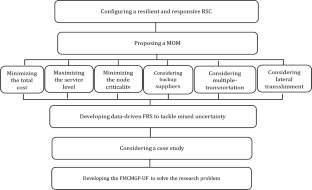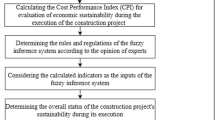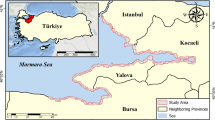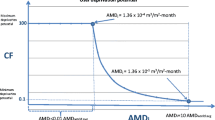Abstract
The crucial role of the Relief Supply Chains (RSCs) in the response phase of disaster management is undeniable. However, the literature shows that the simultaneous consideration of the resilience and responsiveness dimensions in designing the RSCs under mixed uncertainty has been ignored by researchers. In this regard, to cover the mentioned gap, the current study aims to configure an RSC by considering two critically important features namely resilience and responsiveness under mixed uncertainty. For this purpose, this work proposed a multi-stage Decision-Making Framework (DMF). In the first stage, a Multi-Objective Model (MOM) is proposed that minimizes the total cost, maximizes the responsiveness level, and maximizes the resilience of the RSC. In the second stage, to deal with mixed uncertainty, a data-driven robust approach based on the Fuzzy Robust Stochastic (FRS), Seasonal Auto-Regressive Integrated Moving Average Exogenous (SARIMAX), and Artificial Neural Networks (ANN) methods is developed. In the third stage, to solve the proposed model, a novel variant of the goal programming method is developed. In general, the main contribution of this study is to develop a novel data-driven DMF to design a resilient-responsive RSC. To show the applicability and efficiency of the developed decision-making method, a real-world case study, the flood that happened in 2019 in Golestan province, Iran, is considered. Eventually, sensitivity analysis, managerial insights, and theoretical implications are presented. According to the achieved results, primary suppliers 1, 3, 5, and 7 and also backup supplier 1 are selected. Also, the results demonstrate that distribution centers 1, 2, 3, and 5 are established. Moreover, the optimal utilization of different transportation modes is specified in the achieved results. The outputs demonstrate that the developed data-driven FRS approach has better performance in comparison with the deterministic and traditional FRS models. Besides, the outputs indicate that the developed solution method has better performance in comparison with the traditional approaches.

















Similar content being viewed by others
Data availability
All data generated or analyzed during this research are available from the corresponding author upon reasonable request.
References
Abiodun, O. I., Jantan, A., Omolara, A. E., Dada, K. V., Umar, A. M., Linus, O. U., Kazaure, A. A., Gana, U., & Kiru, M. U. (2019). Comprehensive review of artificial neural network applications to pattern recognition. IEEE Access, 7, 158820–158846.
Aghajani, M., Torabi, S. A., & Altay, N. (2023). Resilient relief supply planning using an integrated procurement-warehousing model under supply disruption. Omega, 118, 102871.
Aliakbari, A., Rashidi Komijan, A., Tavakkoli-Moghaddam, R., & Najafi, E. (2022). A new robust optimization model for relief logistics planning under uncertainty: A real-case study. Soft Computing, 26(8), 3883–3901.
Ampountolas, A. (2021). Modeling and forecasting daily hotel demand: A comparison based on sarimax, neural networks, and garch models. Forecasting, 3(3), 580–595.
Arbabi, H., Vahedi-Nouri, B., Iranmanesh, S., & Tavakkoli-Moghaddam, R. (2022). A data-driven multi-criteria decision-making approach for assessing new product conceptual designs. Proceedings of the Institution of Mechanical Engineers, Part B: Journal of Engineering Manufacture, 236(14), 1900–1911.
Bairamzadeh, S., Saidi-Mehrabad, M., & Pishvaee, M. S. (2018). Modelling different types of uncertainty in biofuel supply network design and planning: A robust optimization approach. Renewable Energy, 116, 500–517.
Bankian-Tabrizi, B., Shahanaghi, K., & Jabalameli, M. S. (2012). Fuzzy multi-choice goal programming. Applied Mathematical Modelling, 36(4), 1415–1420.
Boroun, M., Alizadeh, Z., & Jalilzadeh, A. (2023). Accelerated primal-dual scheme for a class of stochastic nonconvex-concave saddle point problems. In: 2023 American control conference (ACC), 31 May 31-02 June 2023, San Diego, California, USA (pp. 204–209). IEEE.
Cheraghi, S., & Hosseini-Motlagh, S.-M. (2020). Responsive and reliable injured-oriented blood supply chain for disaster relief: A real case study. Annals of Operations Research, 291(1), 129–167.
Davoodi, S. M. R., & Goli, A. (2019). An integrated disaster relief model based on covering tour using hybrid Benders decomposition and variable neighborhood search: Application in the Iranian context. Computers & Industrial Engineering, 130, 370–380.
Dubey, R., Gunasekaran, A., & Papadopoulos, T. (2019). Disaster relief operations: Past, present and future. Annals of Operations Research, 283, 1–8.
Dubey, R., Gunasekaran, A., Bryde, D. J., Dwivedi, Y. K., & Papadopoulos, T. (2020). Blockchain technology for enhancing swift-trust, collaboration and resilience within a humanitarian supply chain setting. International Journal of Production Research, 58(11), 3381–3398.
Elluru, S., Gupta, H., Kaur, H., & Singh, S. P. (2019). Proactive and reactive models for disaster resilient supply chain. Annals of Operations Research, 283(1), 199–224.
Farrokh, M., Azar, A., Jandaghi, G., & Ahmadi, E. (2018). A novel robust fuzzy stochastic programming for closed loop supply chain network design under hybrid uncertainty. Fuzzy Sets and Systems, 341, 69–91.
Fazli-Khalaf, M., Mirzazadeh, A., & Pishvaee, M. S. (2017). A robust fuzzy stochastic programming model for the design of a reliable green closed-loop supply chain network. Human and Ecological Risk Assessment: An International Journal, 23(8), 2119–2149.
Foroughi, A., Moghaddam, B. F., Behzadi, M. H., & Sobhani, F. M. (2022). Developing a bi-objective resilience relief logistic considering operational and disruption risks: A post-earthquake case study in Iran. Environmental Science and Pollution Research, 29(37), 56323–56340.
Goli, A., & Malmir, B. (2020a). A covering tour approach for disaster relief locating and routing with fuzzy demand. International Journal of Intelligent Transportation Systems Research, 18(1), 140–152.
Goli, A., Zare, H. K., Tavakkoli-Moghaddam, R., & Sadegheih, A. (2020b). Multiobjective fuzzy mathematical model for a financially constrained closed-loop supply chain with labor employment. Computational Intelligence, 36(1), 4–34.
Goli, A., Zare, H. K., Tavakkoli-Moghaddam, R., & Sadeghieh, A. (2019). Hybrid artificial intelligence and robust optimization for a multi-objective product portfolio problem Case study: The dairy products industry. Computers & Industrial Engineering, 137, 106090.
Homayouni, Z., Pishvaee, M. S., Jahani, H., & Ivanov, D. (2023). A robust-heuristic optimization approach to a green supply chain design with consideration of assorted vehicle types and carbon policies under uncertainty. Annals of Operations Research, 324, 395–435.
Jamali, A., Ranjbar, A., Heydari, J., & Nayeri, S. (2022). A multi-objective stochastic programming model to configure a sustainable humanitarian logistics considering deprivation cost and patient severity. Annals of Operations Research, 319, 1265–1300.
Kaur, H., & Singh, S. P. (2019). Sustainable procurement and logistics for disaster resilient supply chain. Annals of Operations Research, 283(1–2), 309–354.
Kaur, H., & Singh, S. P. (2022). Disaster resilient proactive and reactive procurement models for humanitarian supply chain. Production Planning & Control, 33(6–7), 576–589.
Kumar, P., Singh, R. K., & Shahgholian, A. (2022). Learnings from COVID-19 for managing humanitarian supply chains: Systematic literature review and future research directions. Annals of Operations Research, 1–37.
Lotfi, R., Mehrjerdi, Y. Z., Pishvaee, M. S., Sadeghieh, A., & Weber, G.-W. (2021a). A robust optimization model for sustainable and resilient closed-loop supply chain network design considering conditional value at risk. Numerical Algebra, Control & Optimization, 11(2), 221.
Lotfi, R., Safavi, S., Gharehbaghi, A., Ghaboulian Zare, S., Hazrati, R., & Weber, G.-W. (2021b). Viable supply chain network design by considering blockchain technology and cryptocurrency. Mathematical Problems in Engineering, 2021, 7347389.
Lotfi, R., Nazarpour, H., Gharehbaghi, A., Sarkhosh, S. M. H., & Khanbaba, A. (2022b). Viable closed-loop supply chain network by considering robustness and risk as a circular economy. Environmental Science and Pollution Research, 29(46), 70285–70304.
Lotfi, R., Kargar, B., Gharehbaghi, A., Afshar, M., Rajabi, M. S., & Mardani, N. (2022d). A data-driven robust optimization for multi-objective renewable energy location by considering risk. Environment, Development and Sustainability, Article in Press, 1-22.
Lotfi, R., Kargar, B., Rajabzadeh, M., Hesabi, F., & Özceylan, E. (2022c). Hybrid fuzzy and data-driven robust optimization for resilience and sustainable health care supply chain with vendor-managed inventory approach. International Journal of Fuzzy Systems, 24(2), 1216–1231.
Lotfi, R., Hazrati, R., Aghakhani, S., Afshar, M., Amra, M., & Ali, S. S. (2024). A data-driven robust optimization in viable supply chain network design by considering open innovation and blockchain technology. Journal of Cleaner Production, 436, 140369.
Lotfi, R., Kargar, B., Gharehbaghi, A., & Weber, G.-W. (2022a). Viable medical waste chain network design by considering risk and robustness. Environmental Science and Pollution Research, 1–16.
Madani Saatchi, H., Arshadi Khamseh, A., & Tavakkoli-Moghaddam, R. (2021). Solving a new bi-objective model for relief logistics in a humanitarian supply chain by bi-objective meta-heuristic algorithms. Scientia Iranica, 28(5), 2948–2971.
Mamashli, Z., Bozorgi-Amiri, A., Dadashpour, I., Nayeri, S., & Heydari, J. (2021). A heuristic-based multi-choice goal programming for the stochastic sustainable-resilient routing-allocation problem in relief logistics. Neural Computing and Applications, 33, 14283–14309.
Mohammadi, M., Torabi, S. A., & Tavakkoli-Moghaddam, R. (2014). Sustainable hub location under mixed uncertainty. Transportation Research Part E: Logistics and Transportation Review, 62, 89–115.
Naor, M., & Bernardes, E. (2016). Self-sufficient healthcare logistics systems and responsiveness: Ten cases of foreign field hospitals deployed to disaster relief supply chains. Journal of Operations and Supply Chain Management, 9(1), 1–22.
Nayeri, S., Paydar, M. M., Asadi-Gangraj, E., & Emami, S. (2020). Multi-objective fuzzy robust optimization approach to sustainable closed-loop supply chain network design. Computers & Industrial Engineering, 148, 106716.
Nayeri, S., Torabi, S. A., Tavakoli, M., & Sazvar, Z. (2021). A multi-objective fuzzy robust stochastic model for designing a sustainable-resilient-responsive supply chain network. Journal of Cleaner Production, 311, 127691.
Nayeri, S., Sazvar, Z., & Heydari, J. (2022). A global-responsive supply chain considering sustainability and resiliency: Application in the medical devices industry. Socio-Economic Planning Sciences, 82, 101303.
Nayeri, S., Khoei, M. A., Rouhani-Tazangi, M. R., GhanavatiNejad, M., Rahmani, M., & Tirkolaee, E. B. (2023). A data-driven model for sustainable and resilient supplier selection and order allocation problem in a responsive supply chain: A case study of healthcare system. Engineering Applications of Artificial Intelligence, 124, 106511.
Nezhadroshan, A. M., Fathollahi-Fard, A. M., & Hajiaghaei-Keshteli, M. (2021). Scena. International Journal of Systems Science: Operations & Logistics, 8(4), 321–347.
Sabouhi, F., Bozorgi-Amiri, A., & Vaez, P. (2021). Stochastic optimization for transportation planning in disaster relief under disruption and uncertainty. Kybernetes, 50(9), 2632–2650.
Sazvar, Z., Tavakoli, M., Ghanavati-Nejad, M., & Nayeri, S. (2022). Sustainable-resilient supplier evaluation for high-consumption drugs during COVID-19 pandemic using a data-driven decision-making approach. Article in Press.
Seraji, H., Tavakkoli-Moghaddam, R., Asian, S., & Kaur, H. (2022). An integrative location-allocation model for humanitarian logistics with distributive injustice and dissatisfaction under uncertainty. Annals of Operations Research, 319(1), 211–257.
Shokouhifar, M., & Goli, A. (2023). Designing a resilient–sustainable supply chain network of age-differentiated blood platelets using vertical–horizontal transshipment and grey wolf optimizer. International Journal of Environmental Research and Public Health, 20(5), 4078.
Singh, R. K., Gupta, A., & Gunasekaran, A. (2018). Analysing the interaction of factors for resilient humanitarian supply chain. International Journal of Production Research, 56(21), 6809–6827.
Subulan, K., Taşan, A. S., & Baykasoğlu, A. (2015). A fuzzy goal programming model to strategic planning problem of a lead/acid battery closed-loop supply chain. Journal of Manufacturing Systems, 37, 243–264.
Tafakkori, K., Jolai, F., & Tavakkoli-Moghaddam, R. (2023). Disruption-resilient supply chain entities with decentralized robust-stochastic capacity planning. Reliability Engineering & System Safety, 238, 109447.
Tavakoli, M., Tavakkoli-Moghaddam, R., Mesbahi, R., Ghanavati-Nejad, M., & Tajally, A. (2022). Simulation of the COVID-19 patient flow and investigation of the future patient arrival using a time-series prediction model: A real-case study. Medical & Biological Engineering & Computing, 60(4), 969–990.
Tavakoli, M., Tajally, A., Ghanavati-Nejad, M., & Jolai, F. (2023). A Markovian-based fuzzy decision-making approach for the customer-based sustainable-resilient supplier selection problem. Soft Computing, 27(20), 15153–15184.
Timperio, G., Panchal, G. B., De Souza, R., Goh, M., & Samvedi, A. (2016). Decision making framework for emergency response preparedness: A supply chain resilience approach. In: 2016 IEEE international conference on management of innovation and technology (ICMIT), Bangkok, Thailand, 19–22 September 2016, (pp. 78–82). IEEE.
Tirkolaee, E. B., Torkayesh, A. E., Tavana, M., Goli, A., Simic, V., & Ding, W. (2023). An integrated decision support framework for resilient vaccine supply chain network design. Engineering Applications of Artificial Intelligence, 126, 106945.
Yousefi-Babadi, A., Bozorgi-Amiri, A., Tavakkoli-Moghaddam, R., & Govindan, K. (2023). Redesign of the sustainable wheat-flour-bread supply chain network under uncertainty: An improved robust optimization. Transportation Research Part E: Logistics and Transportation Review, 176, 103215.
Zahiri, B., Zhuang, J., & Mohammadi, M. (2017). Toward an integrated sustainable-resilient supply chain: A pharmaceutical case study. Transportation Research Part E: Logistics and Transportation Review, 103, 109–142.
Zhalechian, M., Tavakkoli-Moghaddam, R., Zahiri, B., & Mohammadi, M. (2016). Sustainable design of a closed-loop location-routing-inventory supply chain network under mixed uncertainty. Transportation Research Part E: Logistics and Transportation Review, 89, 182–214.
Author information
Authors and Affiliations
Contributions
All authors contributed to all parts of this research including Conceptualization; Data collection; Formal analysis; Investigation; Methodology; Resources; Software; Supervision; Validation; Visualization; and Writing–review & editing.
Corresponding author
Ethics declarations
Conflict of interest
The authors declare that there is no potential conflict of interest concerning the research, authorship, and/or publication of this paper.
Ethical approval
The authors certify that they have no affiliation with or involvement with human participants or animals performed by any of the authors in any organization or entity with any financial or non-financial interest in the subject matter or materials discussed in this paper.
Additional information
Publisher's Note
Springer Nature remains neutral with regard to jurisdictional claims in published maps and institutional affiliations.
Rights and permissions
Springer Nature or its licensor (e.g. a society or other partner) holds exclusive rights to this article under a publishing agreement with the author(s) or other rightsholder(s); author self-archiving of the accepted manuscript version of this article is solely governed by the terms of such publishing agreement and applicable law.
About this article
Cite this article
Javan-Molaei, B., Tavakkoli-Moghaddam, R., Ghanavati-Nejad, M. et al. A data-driven robust decision-making model for configuring a resilient and responsive relief supply chain under mixed uncertainty. Ann Oper Res (2024). https://doi.org/10.1007/s10479-024-06038-w
Received:
Accepted:
Published:
DOI: https://doi.org/10.1007/s10479-024-06038-w




